
views
X
Trustworthy Source
Harvard Medical School
Harvard Medical School's Educational Site for the Public
Go to source
Treating peptic ulcers with medications can help minimize pain and avoid medical complications like bleeding, scar tissue, and infection.
Getting Diagnosed

Visit your doctor. Burning stomach pain is the most common symptom of a peptic ulcer, and nausea and heartburn are common, as well. You may notice that the pain is worse after you eat, especially if you eat acidic or spicy foods. Over-the-counter antacids like Pepto-Bismol, Tums and Rolaids often help the pain, but when the pain keeps coming back, see your doctor to discuss your symptoms. You may notice that the pain radiates to the right or left side of your abdomen. Other severe symptoms of ulcers can include blood in your vomit (hematemesis) or stool (hematochezia). Seek immediate medical attention if you have nausea and vomiting after eating, your vomit looks dark or like coffee grounds, or your stool has a tarry black appearance. Ask your doctor something like, “I used to get heartburn after eating spicy food, but Tums would always help. Now I feel like the pain is worse and comes back more often. Do you think it’s something other than just heartburn?” It’s helpful to describe your symptoms and how they have changed over time.
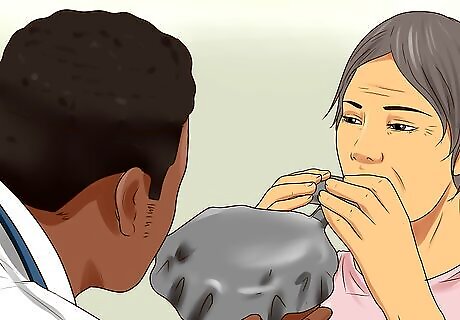
Get a breath test at your doctor’s office. The most accurate way to test for the presence of H. pylori is with a breath test. However, this test is not used very often in a clinical setting. If you’re having symptoms of a peptic ulcer, your healthcare provider can do this test to determine whether the bacteria is present. The test requires drinking a special liquid and then later blowing into a bag. A stool sample can also be used to diagnose H. pylori infection. This is the best way to detect H. pylori if it is an acute infection. Be sure to tell your doctor if you are taking any medications, as this can also help with diagnosis. Using NSAIDS, smoking, and alcohol consumption can make this disease worse.

Undergo an endoscopy if you have symptoms of bleeding or unexplained weight loss. This is the most frequent method of diagnosing a peptic ulcer. With an endoscopy, your doctor uses a scope (a small visualizing device) to look at your stomach, and possibly take a small sample of the lining to biopsy. This is usually done if you have severe symptoms of peptic ulcers like bleeding, weight loss for no reason, or trouble with eating or swallowing. Your doctor may give you a mild sedative for the procedure. If the ulcer is bleeding, your gastroenterologist may be able to treat it with the scope. However, if the bleeding is severe, you may need to go into the hospital and get medications through an IV to treat it. You may also need an endoscopy if you are over age 45, even without more severe symptoms.
Minimizing Symptoms

Stop smoking. Many people have the H. pylori infection but don’t have any symptoms or problems with peptic ulcers. Smoking increases your risk of developing peptic ulcers if you have H. pylori present in your stomach. Stop smoking to reduce your risk of further ulcers and help those you do have to heal. Use the START Acronym to stop smoking: S= Set a quit date. T= Tell friends and family that you plan to quit. A= Anticipate challenges. R = Remove tobacco from the home, car, and work. T= Talk to your doctor for more support and advice on quitting.
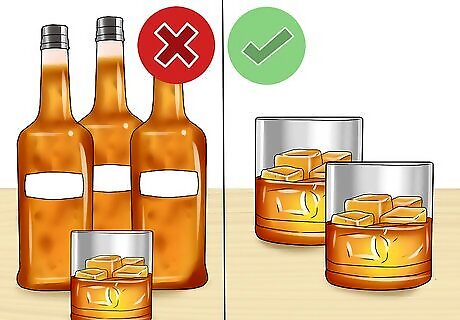
Limit your alcohol intake. The pain from peptic ulcers comes from stomach acid contacting the sore in the lining of the stomach or duodenum. Drinking alcohol increases the amount of stomach acid and causes irritation in the stomach lining, and increases the pain of ulcers. Stop drinking alcohol or limit your consumption as much as possible to reduce symptoms.
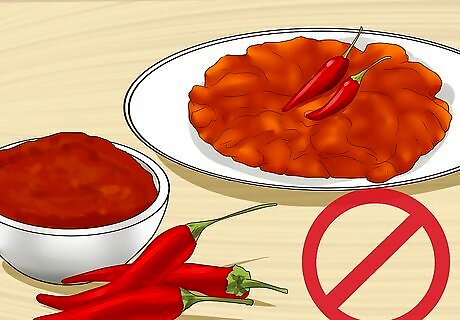
Avoid spicy foods. Eating spicy food does not cause peptic ulcers, but it can worsen your stomach irritation when ulcers are present and make pain more severe. Limit your spicy foods to improve symptoms. Eating and drinking foods that increase stomach pH (make it less acidic in your stomach) can also help with pain. Milk, for instance, may decrease symptoms temporarily.

Take over-the-counter antacids. You can buy a number of acid-decreasing medicines from your local drug store. These won’t heal your ulcers, but they will probably help with your pain at least temporarily. Try antacids like Tums, Rolaids, or Pepto-bismol. The definitive treatment for peptic ulcer disease is triple therapy. This is when they give you three medications including an antacid and antibiotics to clear the infection, while sometimes a repeat endoscopy is needed to cure the infection/peptic ulcer.
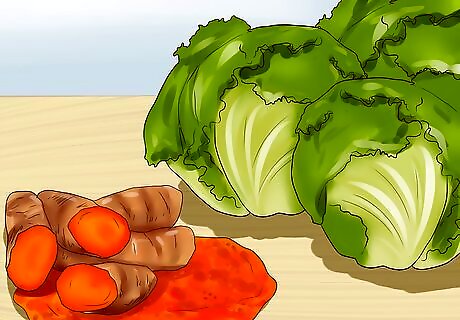
Try botanical treatments like cabbage and turmeric. Alternative medicine should not be used alone to treat peptic ulcers, since ulcers can cause severe complications and require medical treatment. However, use of botanicals at home may help symptoms. Cabbage is a good choice, as is turmeric, neem bark extract, mastic, and licorice. Always consult with your doctor before trying natural remedies.

Decrease your stress level. Like spicy foods, feeling really stressed out might worsen the symptoms of pain caused by ulcers. Stress releases a hormone called cortisol, which negative affects numerous body systems – including your digestive tract. Try yoga, meditation, deep breathing, taking a walk – anything that helps you relax. If you have a stressful lifestyle due to work or family, practice mindfulness meditation or learn stress management skills. You cannot eliminate stress from your life, but you can control how you deal with it. Maintaining a calm, peaceful demeanor will help to improve your pain and health. Keep in mind that quantifying stress can be difficult on a clinical level. While certain psychosocial factors influence the development of ulceration, these factors need to correlate with psychophysiological factors as well.
Getting Medical Care for Peptic Ulcers
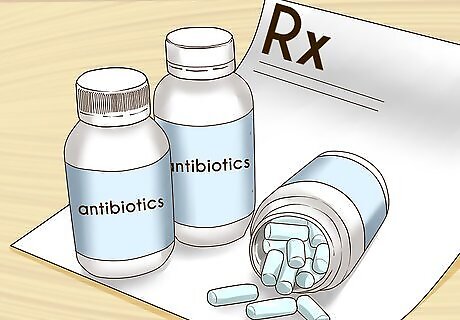
Kill H. pylori with antibiotics. The treatment for peptic ulcers varies depending on what caused them. H. pylori infection is the most common cause, so usually treatment is with antibiotics to kill the bacteria. H. pylori is pretty resistant, or hard to kill, so you will take several antibiotics in combination. Your doctor will prescribe some combination of tetracycline (Tetracycline HCl), clarithromycin (Biaxin), amoxicillin (Amoxil), metronidazole (Flagyl), tinidazole (Tindamax), or levofloxacin (Levaquin). You will usually take these antibiotics for 2 weeks, plus other medications to decrease your stomach acid and promote healing.
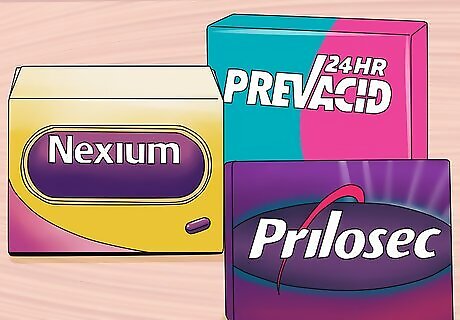
Aid healing with acid-reducing medications. A class of drugs called Proton Pump Inhibitors (commonly PPIs) decreases acid production in your stomach and helps your ulcers to heal. You will almost always take a PPI like Prilosec, Protonix, Nexium or Prevacid while your ulcers are healing. Histamine blockers (H-2’s) like Pepcid and Zantac also reduce stomach acid, and may be prescribed. The combination of antibiotics, antacid, and PPI is called triple therapy, and this is very effective in the treatment of Peptic Ulcer Disease. Your doctor may prescribe these medications.
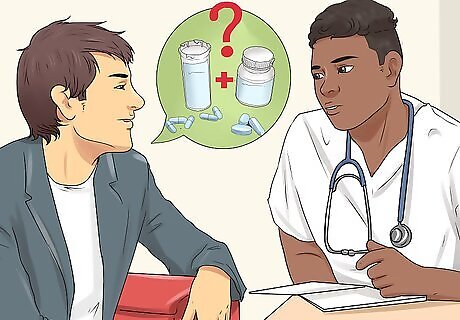
Discuss with your doctor whether you need additional medications. PPIs can increase your chances of bone fractures, so if you are at risk of having low calcium your doctor may prescribed a calcium supplement. It’s possible that you will also be prescribed an antacid to reduce pain, or perhaps a medication to protect the inner surface of your stomach like Carafate or Cytotec. Discuss your health problems and medications with your doctor to get the best drug combination for you. Share questions and concerns with your provider, such as, “You mentioned that the medication you’re giving me can decrease my calcium. I have osteoporosis, so is there something I should do about that?” Further, PPI’s can decrease the bioavailability of other medications depending on how they are metabolized and absorbed by the intestine.
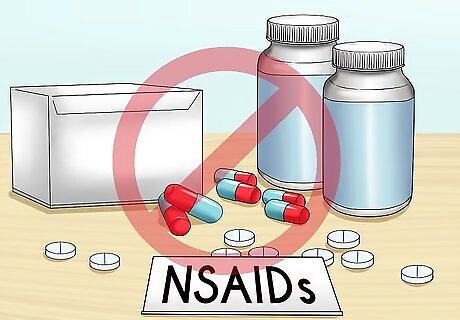
Stop your use of NSAIDs. Nonsteroidal anti-inflammatory drugs, when used long-term, can also cause or prevent healing of peptic ulcers. If you regularly take over-the-counter pain relievers, discuss alternatives with your doctor. Switching to something gentler on the stomach can help ulcers to heal. Some common NSAIDs include aspirin, ibuprofen products like Motrin and Advil, and Naproxen products such as Aleve and Anaprox. If you must continue using NSAIDs, your doctor can give you a PPI medication to take simultaneously to lower your risk of ulcers.
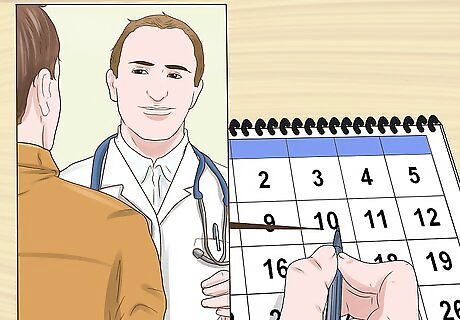
Schedule a follow-up appointment when you’re done with your medicine. Once you have finished the treatment prescribed by your doctor, go back to ensure your ulcers have healed. Another breath test may be performed. If you have ongoing symptoms, you might need an endoscopy. An endoscopy is usually done 6-8 weeks after you are first diagnosed with peptic ulcers, and can also be used to make sure you do not have gastric cancer.




















Comments
0 comment